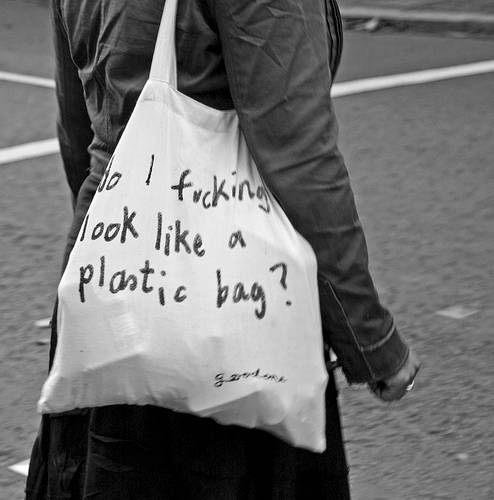 I know it’s annoying when I dig out plastic cups from the trash so I can put them in recycling. I also know it’s annoying when I say, “Sorry, I can’t eat that; I’m a vegetarian.” But why? I don’t smell like patchouli oil. I don’t put “terrorist” stickers on SUVs. I’m often too lazy to ride my bike.
I know it’s annoying when I dig out plastic cups from the trash so I can put them in recycling. I also know it’s annoying when I say, “Sorry, I can’t eat that; I’m a vegetarian.” But why? I don’t smell like patchouli oil. I don’t put “terrorist” stickers on SUVs. I’m often too lazy to ride my bike.
Yet even I can get annoyed with “being green.” It has become cliché. It’s as posh as Posh Spice. It’s trendy. It’s like the aisle of raw meat at the grocery store . . . it stinks. It reeks of money and corporate manipulation. It’s ripe for criticism from conservatives and serves as evidence of the left’s gullibility.
So how did we get here? How is it that caring for the environment and taking bags to the grocery store marks us as idiots ― as part of the “greenwashing” conspiracy?
For every movement there is a counter-movement. One I have found to the green movement is www.globalwarminghoax.com. I spent some time browsing posts, searching for the answer to what makes the green movement so annoying. The word that stuck out in most every post ― from those claiming Al Gore is the anti-Christ, to passionate leftists wanting to save polar bears ― was facts.

“Facts” are flowing through this website like oil in the Gulf. And like the oil there, no one seems to understand the origin of these “facts.” They just use them as undeniable truths. This torrent of “facts” ― when presented as one side arguing against another, neither of which being the origin of said “facts” ― seem to cancel each other out. Each side then resorts to the same argument: “You’re an idiot.”
And I am left with the remaining question: What’s so annoying about being green? And how can we save the planet if we’re turning people off by the mere mention of its demise?
 I sought out Champaign-Urbana’s local Green Party for help. Joe Futrelle was happy to answer my questions, and offer some guidance in my search for ways to save the green movement.
I sought out Champaign-Urbana’s local Green Party for help. Joe Futrelle was happy to answer my questions, and offer some guidance in my search for ways to save the green movement.
Me: “Does the word “green,” help or hurt the Green Party?
Joe: “The biggest problem with the term ‘green’ is that it is closely associated with environmental issues, and in the minds of many voters, those issues are unconnected with other major aspects of the Green Party’s philosophy, including social justice, community-based economics, electoral reform, and feminism . . . we are often pigeonholed as an environmentalist ‘interest group’ rather than as a party that is calling for comprehensive change in many areas.
Me: “How can the green movement break free of stereotypes?”
Joe: “That is a political question of great importance, and our approach is to put forward credible candidates that offer real solutions to immediate problems. . . . People in the movement need to do the same. Instead of guarding the environmentalist subculture we need to embrace the aspects of mainstream culture that are compatible with sustainability.”
Credible candidates . . . this brings me back to “facts.” The fact is, if we want to convince those who are annoyed by us, we must put forth representatives who break free of stereotypes. We can’t go around saying: “Dude, we should make cars out of hemp,” and expect 80-year-old women who have always voted Republican to take environmental issues seriously. We also can’t drive expensive hybrids and expect hippies to buy them . . . where are dogs supposed to ride in those things anyway?
Back to my interview with Joe . . .
Me: “I recently interviewed a U of I graduate student who said she didn’t recycle because it took too much time. She also said that she was offended by the green movement because it made her feel bad about herself, and she didn’t consider herself a bad person just because she doesn’t think about the environment.”
Joe: “It’s really important that we get outside the framing of environmentalism as an issue of individual consumer choice. . . . If people were involved in the choices being made in government and industry, we could apply policy levers that are much, much more powerful than trying to police each other individually and shame each other into taking individual steps. . . . It is not going to be possible to build a movement for change by having people bicker over who makes marginally better consumer choices. We need a mass movement, not a subculture, to bring about the big changes we need.”
This scares me. If we can’t even get past our dodge-ball game of facts, how will we form a mass-movement? If we can’t decide between paper and plastic at the grocery store, how can we move forward?
Joe ended our conversation with a final thought: “I should add that self-righteous attitudes about anything are offensive to me, but we’re in the midst of a global environmental crisis and what attitude we take is much less important than what action we take to move our own lives and society in the direction of sustainability. No one ought to feel anything but humbled by the scale of the task we face if we are to succeed. And if we’re satisfied with changing a few individual consumer choices, we will fail.”
It seems clear to me that combative attitudes do nothing to sway one side to another. But how can we win if our actions themselves ― consumer choices ― are offensive and reinforce counter ideas? Some people buy extra large trucks and are proud to call them “gas-guzzlers” just because they’re annoyed by the green movement. How can we win?
By educating ourselves on the companies that sell “green” products. By involving ourselves in government and choices larger than our day-to-day tasks. By supporting agencies with similar ideals. Greens, to me, are intelligent, humble, willing to talk, and you don’t need to pop a Benadryl after they walk by. We should aim higher than arguments with neighbors, especially with those we will never convince. And the next time someone poo-poos your compost bin, or rolls their eyes when you insist on buying local produce, skip the lecture on “facts about the environment.” Chances are they’ll have their own “facts” to throw right back.









